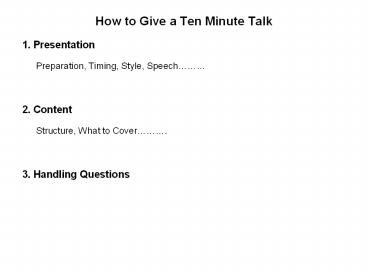How to Give a Ten Minute Talk PowerPoint PPT Presentation
1 / 7
Title: How to Give a Ten Minute Talk
1
How to Give a Ten Minute Talk
- 1. Presentation
- Preparation, Timing, Style, Speech
- 2. Content
- Structure, What to Cover.
- 3. Handling Questions
2
Presentation
- Preparation
- Dont leave it till the last minute!
- Proof-reading
- Timing
- 2/3 minutes per slide
- nervous faster, side-track longer
- When practising, speak aloud
- Keep an eye on the time
- Landscape vs Portrait
- Overheads can be either, but watch the margins
- Slides tend to be in landscape
- Keep important information in the top 2/3
3
- Word-Processing
- More Professional
- Range of Highlighting Techniques
- DONT PUT EVERYTHING IN CAPITALS
- Colour (pens) BLUE GREEN NOT RED
- Font Size
- 12 point Times too small this is Arial 18 point
- Diagrams - choose suitable settings for line
width and font size - Speech
- Dont rush!
- Dont mumble!
- Learn first slide give yourself enough
prompts! - Mechanical Details
- Number slides, or hold in a file
- Focus the audiences attention
- Avoid switching OHP on/off
4
Content
- Introduction
- Background to the relevant chemistry
- Length 1 or 2 slides of 5
- Results and Discussion
- Main body of the talk 2 or 3 slides out of 5
- Give examples and include yields, experimental
detail, mechanistic detail - Say how the results were determined, or
conclusions reached - Include pictures, diagrams and tables that add
interest or clarity - For confidence, check naming of compounds and
abbreviations - Conclusions
- What have you shown in this talk? (bullet
points) - If the talk title is a question can you answer
it?
5
Handling Questions
- Questions
- Invite questions
- Preparation practise drawing structures and
transition states - Remember you are the specialist
- Learn from the questions!
- And in later years talking about your honours
project - References
- Useful books or reviews that cover the chemistry
youve talked about - Any work that youve published
- Interesting reagent prep. etc.
- Acknowledgements
- Supervisor, postdocs etc. for technical
assistance - Funding body
- Abstract
- For a job interview you may wish to have an A4
abstract of your talk
6
FAQs
- Talk title
- Assigned talk title codes are posted on
Chemistry 3 noticeboard. - Booklet with titles for each code and a key
reference also on the noticeboard (copies also
available in the CTO Office) - Preparation
- Week 6, if you get really stuck go and find the
staff member who assigned the talk title (do not
bother them with trivial questions -remember
they may be assessing you!) - Overheads
- You can collect 6 blank acetates from the CTO
Office. - When and Where?
- Weeks 7 or 8 in the Transferable skills
timetable session, location as posted on the
Chemistry 3 noticeboard.
7
Assessment and Feedback
- Mechanism
- Two staff members will assess you talk using the
criterion outlined on the feedback sheet - A completed feedback sheet will be returned to
you. - Your fellow students will be asked to help with
feedback! - Assessment Categories
- Content
- Manner of Delivery
- Clarity of Delivery
- Quality of Overheads/slides/blackboard work

